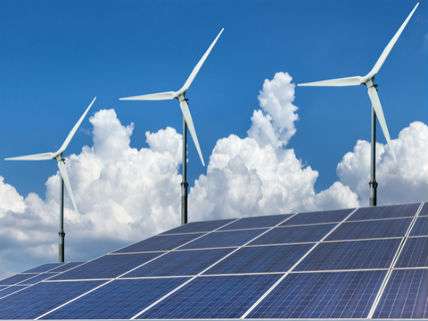Solar and Wind Power Won't Work Without Natural Gas as a Back-Up, Says New Study
To be against fracking is to be against renewable energy.

Anti-fracking pro-renewable energy activists are walking contradictions, according to a new study at the National Bureau of Economic Research. Three economists find that natural gas electricity generation complements and enables the deployment of renewable energy generation. To be against fracking is to be against renewable energy.
In their survey of 26 Organization of Economic Cooperation and Development countries, the economists find that natural gas and renewable power generation increase in nearly a one-to-one ratio. Why is that? Because intermittent solar and wind energy cannot be stably integrated into the power grid unless there is a back-up source of electricity when the sun does not shine and the wind fails to blow. The researchers note that 8 megawatts of back-up capacity are required for any 10 megawatts of wind capacity added to the grid. They cite other research that suggests that the ability to store solar electricity for 20 hours is necessary for photovoltaic power to work as a base-load resource. Since no such massive storage technology currently exists, only fast reacting fossil fuel power generation can fill in this gap.
The researchers also point out that projections of falling renewable technologies costs fail to take into account the costs of constructing and maintaining fast reacting fossil fuel (chiefly natural gas) back-up power. From the study …
… the estimated indirect costs of renewables are at least an order of magnitude greater than those associated with dispatchable fossil-fuel technologies. For the latter, system costs are relatively modest, generally estimated below USD 3 per MWh (megawatt-hour) in OECD countries. For the formers, such costs are as high as USD 40 per MWh for onshore wind, USD 45 per MWh for offshore wind and USD 80 per MWh for solar. These high estimates are the direct results of the need for additional system reserves and back-up generation to ensure system reliability. Renewable energy system costs will also increase over-proportionally with the amount of variable electricity in the system, with far-fetching [reaching] implications for the energy markets and security of supply. Ignoring them can thus lead to a severe underestimation of the social and private costs of any energy transition.
In the Washington Post, one of the researchers, Elena Verdolini from the Fondazione Eni Enrico Mattei, observes:
"If you have an electric car, you don't need a diesel car in your garage sitting there. But in the case of renewables, it's different, because if you have renewable electricity and that fails, then you need the fast acting gas sitting in your garage, so to speak."
Basically, the study makes the point that evironmental activists had better come to grips with the fact that natural gas is indeed a "bridge fuel" to any renewable energy technology future. In addition, they should recognize that deploying renewable energy technologies will cost a lot more than many of their rosy projections of falling wind and solar power technology prices suggest that it will.
Maybe activists should reconsider the advantages of no-carbon nuclear power?


Show Comments (57)